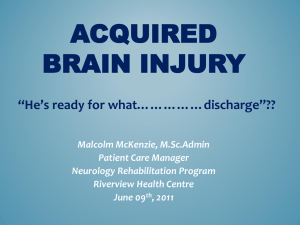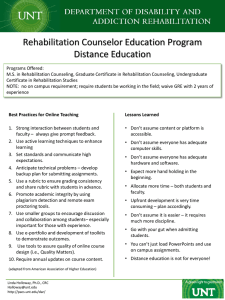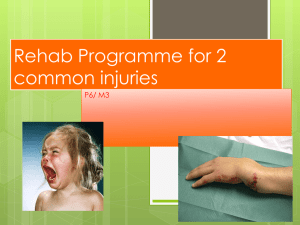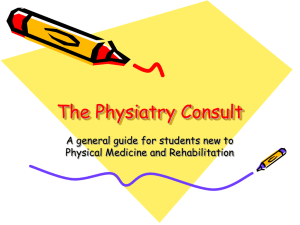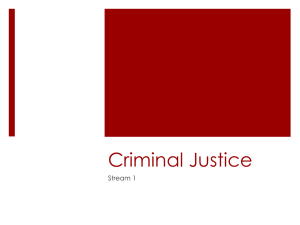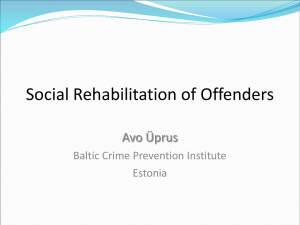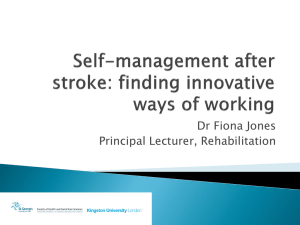a brief overview of activities, programs and research conducted at
advertisement
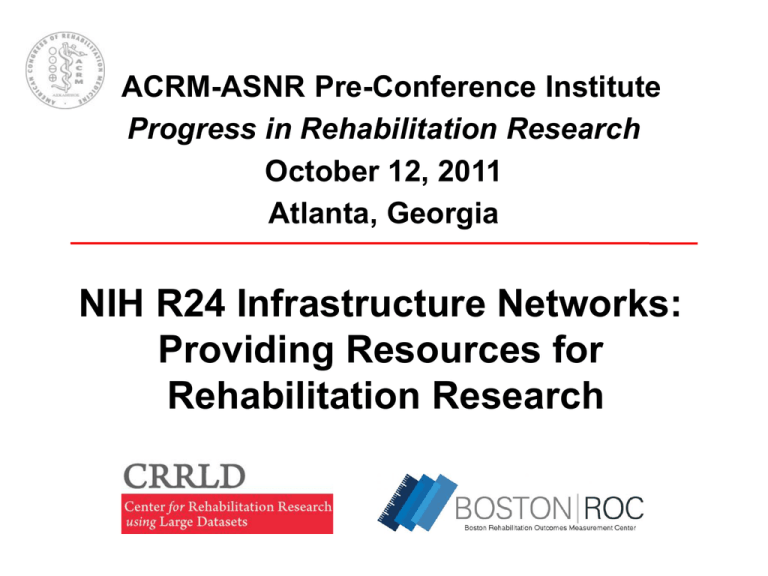
ACRM-ASNR Pre-Conference Institute Progress in Rehabilitation Research October 12, 2011 Atlanta, Georgia NIH R24 Infrastructure Networks: Providing Resources for Rehabilitation Research ACRM-ASNR Pre-Conference Institute Morning: Center for Rehabilitation Research using Large Datasets University of Texas Medical Branch, Galveston, TX Afternoon: Boston Rehabilitation Outcomes Measurement Center Boston University - Health & Disability Research Institute, Boston, MA ACRM-ASNR Pre-Conference Institute Morning Agenda 8:00 - 8:15 Welcome and Introduction 8:15 - 8:50 Center for Rehabilitation Research Using Large Datasets 8:50 - 9:30 Overview of large datasets management 9:30 - 10:15 Perspectives on analyzing large datasets 10:15 - 10:45 Break 10:45 - 11:00 Ethical Considerations (IRB, privacy, HIPAA) in large database research 11:00 - 12:00 Questions and Discussion 12:00 - 1:00 Lunch (provided) and informal discussion with presenters ACRM-ASNR Pre-Conference Institute Afternoon Agenda 1:00 - 1:30 Boston Rehabilitation Outcomes Measurement Center Overview 1:30- 2:00 Incorporating Patient Reported Outcome Measures in Medical Rehabilitation Research: Factors to Consider 2:00 - 2:30 Selecting and Standardizing Performance-Based Measures 2:30 - 3:00 Using Instrumented Outcome Measures: What’s New in Wearable Sensor Technology? 3:00 - 3:30 Questions and Discussion 3:30 - 4:00 Break 4:00 - 5:30 Case discussion Center for Rehabilitation Research using Large Datasets Kenneth J. Ottenbacher University of Texas Medical Branch Galveston, TX http://rehabsciences.utmb.edu/r24 Disclosures National Institutes of Health Grants: R24 HD065702; R01 AG017638; K12 HD055929; T32 HD007539 PI: Kenneth J. Ottenbacher National Center for Medical Rehabilitation Research (NICHD); National Institute on Neurological Disorders and Stroke; and National Institute on Aging Department of Education Grants: H133G080163; H133P110012 PI: Kenneth J. Ottenbacher National Institute on Disability and Rehabilitation Research Learning Objectives • Describe the purpose and mission of the NIH R24 Infrastructure Network Program • Identify the services available through the R24 Infrastructure Networks/Centers focused on outcomes research • Learn how to apply for pilot funding, training opportunities, and visiting scientist positions • Understand basic issues and challenges in conducting outcomes research using secondary analysis of large datasets Galveston, TX Galveston University of Texas Medical Branch UTMB Academic Health Science Center Academic Programs • School of Medicine • School of Nursing • School of Health Professions • Graduate School of Biomedical Sciences Areas of Research: Aging, Tropical/Infectious Disease, Structural Biology, Minority (Hispanic) Health, Neuroscience, 3 WHO Collaborating Centers Outline • • • • • • Mission / Description Need for the Center Structure & Partners Programs & Activities Resources Future Plans NIH Rehabilitation Research Support The R24 rehabilitation research infrastructure program, supported by the NIH, currently funds seven centers around the country. http://www.ncmrr.org • Engineering for Neurological Rehabilitation Rehabilitation Institute of Chicago and Northwestern University • Center for Translation of Rehabilitation Engineering Advances and Technology Dartmouth College & Simbex Infrastructure Grant • Boston Rehabilitation Outcomes Measurement Center Boston University • Core for Molecular and Functional Outcome Measures in Rehabilitation Medicine Research Center for Genetic Medicine at Children’s National Medical Center, Washington DC • National Center for Simulation in Rehabilitation Research Stanford University and Simbios • Medical Rehabilitation Research Infrastructure Program in Muscle University of California at San Diego Center for Rehabilitation Research using Large Datasets The goal of the Center is to build rehabilitation research capacity by increasing the quantity and quality of rehabilitation outcomes research using large administrative and research datasets. Need for the Center • Rehabilitation investigators are trained to conduct (prospective) clinical, patientoriented research, not secondary data analysis • A large number of datasets are available that include information related to rehabilitation and disability • Advances in bioinformatics, information technology and the internet have resulted in easier access to aggregated information CRRLD Consortium Partners • Rehabilitation Sciences Academic Division & Research Center (University of Texas Medical Branch) • Center for Rehabilitation Outcomes Research (Rehabilitation Institute of Chicago) • Uniform Data System for Medical Rehabilitation (University at Buffalo) • Employment and Disability Institute (Cornell University) Center for Rehabilitation Research using Large Datasets Raise Awareness Teach Knowledge & Skills Provide in Person Training Conduct Pilot Projects Interdisciplinary Collaborative Research OBJECTIVE 1 Education & Training • Courses • Workshops • Symposium • Modules OBJECTIVE 2 Pilot Projects • Faculty Mentors OBJECTIVE 3 Collaboration • Visiting Scholars Monitoring and Evaluation Creation of Best Practices for Reporting Dataset Research in Rehabilitation Increase Research Capacity Web Site Database Directory Algorithm Repository Activities • Raise Awareness. Seminars and workshops designed to raise awareness among investigators, educators, and practitioners regarding the importance of secondary data analysis. These will be presented at professional meetings and conferences. • Web Site. Establish a website that will provide information generated from Center activities and programs. For example, training materials and modules will be available on the web. http://rehabsciences.utmb.edu/r24 http://rehabsciences.utmb.edu/r24 Activities • Education and Training. Create training materials & modules related to large database research. Examples: 1) Security, privacy and IRB issues; 2) Data management (general); and 3) Methods of data analysis including missing data and selection bias. • Data Directory. Develop a directory of existing datasets including descriptions of how to access the information, a listing of the variables contained in the dataset, the purpose of the dataset, and contact information. Activities • Visiting Scholars Program. Rehabilitation investigators will work with experienced scientists at one of the consortium institutions, using large datasets to address questions important to rehabilitation and disability outcomes. Support is provided up to six months. • Pilot Project Program. Funding available for pilot studies in which rehabilitation investigators conduct research in collaboration with a CRRLD mentor/collaborator using a large dataset. Pilot Studies • Functional Independence and Healthcare Experiences Following Discharge from Inpatient Rehabilitation Juli Wylegala, PhD, PT, University of Buffalo • Comparison of Rehabilitation Outcomes of Veterans and Medicare Beneficiates Diane M. Collins, PhD, OTR, University of Pittsburgh • Predictors of Functional Disparities among Individuals Living with Spinal Cord Injury Denise Fyffe, PhD, Kessler Foundation Research Center • Frailty transitions and frailty-free life expectancy among older Mexican Americans: Gender differences Soham Al Snih, MD, PhD, University of Texas Medical Branch Sample Datasets • Centers for Medicare and Medicaid Services • Uniform Data System for Medical Rehabilitation • Medical Expenditure Panel Survey (AHRQ) • Hispanice Established Population Epidemiological Study of the Elderly (NIA) • American Community Survey (U.S. Census Bureau) • Health and Retirement Survey (NIA) • Mexican Health and Aging Study (NIA) • National Health and Nutrition Examination Survey (CDC) UDSMR Data • Currently about 850 facilities subscribe to the UDS database service • Database contains records from 1987 to present (>10 million records) • Proprietary database requires license and data-use agreement • Includes data on non-Medicare patients http://www.udsmr.org Sample Data Files • Inpatient Rehabilitation Facility - Patient Assessment Instrument (IRF-PAI) files (2002 – 2009) • MedPAR files (1999 - 2009) • Beneficiary Summary files (1999 - 2009) • Provider of Service (2001- 2009) • Area Resource File (2008 Access: HRSA) http://www3.cms.gov/InpatientRehabFacPPS/04_IRFPAI.asp Collaboration Opportunities for collaboration on rehabilitation outcomes research using large datasets. Doing outcomes research is a lot like raising children… you always think you are going to do a better job next time. The End http://rehabsciences.utmb.edu/r24/ACRM.asp Contact Information Center for Rehabilitation Research using Large Datasets Rehabilitation Sciences Academic Division & Research Center 301 University Boulevard Galveston, Texas 77555-1137 Phone: (409) 747-1637 Fax: (409) 747-1638 Email: rehab.info@utmb.edu

